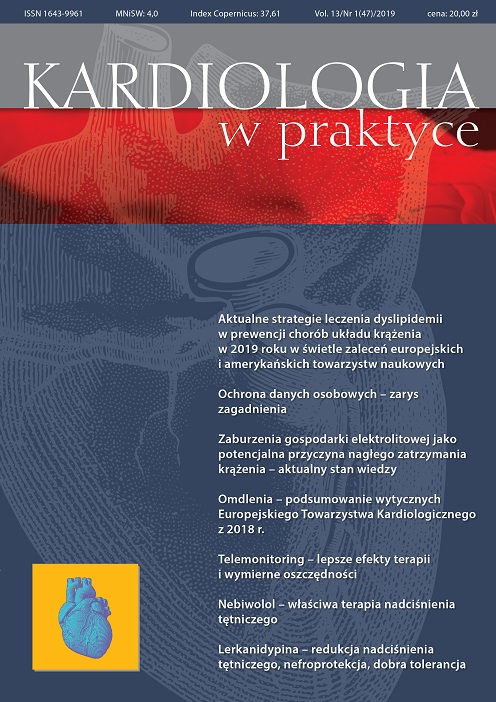Lercanidipine – reduction of hypertension, nephroprotection, good tolerance Review article
Main Article Content
Abstract
Lercanidipine is a long-acting, lipophilic antagonist of the 3rd generation of calcium channels. It causes vasodilatation of both arterioles in the glomerulus, which determines its nephroprotective effect, confirmed in clinical studies. It is characterized by good tolerance of treatment.
Downloads
Article Details
Copyright: © Medical Education sp. z o.o. This is an Open Access article distributed under the terms of the Attribution-NonCommercial 4.0 International (CC BY-NC 4.0). License (https://creativecommons.org/licenses/by-nc/4.0/), allowing third parties to copy and redistribute the material in any medium or format and to remix, transform, and build upon the material, provided the original work is properly cited and states its license.
Address reprint requests to: Medical Education, Marcin Kuźma (marcin.kuzma@mededu.pl)
References
2. Tykarski A., Filipiak K.J., Januszewicz A. et al.: Zasady postępowania w nadciśnieniu tętniczym – 2019 rok. Nadciśnienie Tętnicze w Praktyce 2019; 5(1): 1-86.
3. Cerbai E., Mugelli A.: Lercanidipine and T-type calcium current. Eur. Rev. Med. Pharmacol. Sci. 2018; 22(12): 4025-4031.
4. Della Vestra M., Pozza G., Mosca A. et al.: Effect of lercanidipine compared with ramipril on albumin excretion rate in hypertensive Type 2 diabetic patients with microalbuminuria: DIAL study (diabete, ipertensione, albuminuria, lercanidipina). Diabetes Nutr. Metab. 2004; 17(5): 259-266.
5. Robles N.R., Ocon J., Gomez C.F. et al.: Lercanidipine in patients with chronic renal failure: the ZAFRA study. Ren. Fail. 2005; 27(1): 73-80.
6. Robles N.R., Romero B., de Vinuesa E.G. et al.: Treatment of proteinuria with lercanidipine associated with renin-angiotensin axis-blocking drugs. Ren. Fail. 2010; 32(2): 192-197.
7. Robles N.R., Colvo C., Sobrio J. et al.: Lercanidipine valuable effect on urine protein losses: the RED LEVEL study. Curr. Med. Res. Opin. 2016; 32(2): 29-34.
8. Cherubini A., Fabris F., Ferrari E. et al.: Comparative effects of lercanidipine, lacidipine, and nifedipine gastrointestinal therapeutic system on blood pressure and heart rate in elderly hypertensive patients: the ELderly and LErcanidipine (ELLE) study. Arch. Gerontol. Geriatr. 2003; 37: 203-212.
9. Lund-Johansen P., Stranden E., Helberg S. et al.: Quantification of leg oedema in postmenopausal hypertensive patients treated with lercanidipine or amlodipine. J. Hypertens. 2003; 21: 1003-1010.
10. Barrios V., Escobar C., de la Figuera M. et al.: High doses of lercanidipine are better tolerated than other dihydropyridines in hypertensive patients with metabolic syndrome: results from the TOLERANCE study. Int. J. Clin. Pract. 2008; 62(5): 723-728.
11. Borghi C., Prandin M.G., Dormi A. et al.: Improved tolerability of the dihydropyridine calcium-channel antagonist lercanidipine: the lercanidipine challenge trial. Blood Press. 2003; 1: 14-21.

